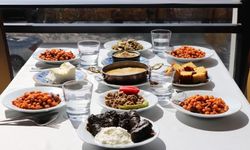Vedat Milor, a prominent figure in the realm of Turkish gastronomy, shared his insights on food, wine, culture, Michelin, and the HORECA sector in Türkiye in an exclusive interview with Okan Yüksel, the Editor-in-Chief of HORECA TREND Newspaper.
"When it comes to gastronomy in Türkiye, food is the first thing that comes to mind. The dimension of 'drinking' is often overlooked. Yet, in the world, one of the most important companions to food is beverages, especially wine. What are your thoughts on this matter in Türkiye's restaurant management and chef scene?"
That is very true. There's something I often say: 1+1 can equal 3. What does that mean? If we manage to pair the right wine with the right dish, we can elevate the entire dining experience to a higher level. How can we achieve this? First of all, notice that I said the right wine. Wine is such a complex beverage that experiencing this harmony with any other drink, except for some exceptions, is nearly impossible. Of course, when people hear this, they sometimes feel as if their preferences are being insulted and they resist such directives. They have valid points. After all, eating is primarily about pleasure. It's a tool that allows us to escape the difficulties of life and enjoy it even more, sometimes even an aim. So, saying, "No, you shouldn't enjoy it that way, look, you'll drink this wine and enjoy it" would be wrong. Please don't misunderstand. I'm simply emphasizing that I'm trying to identify what is gastronomically correct. Otherwise, why would someone who doesn't enjoy wine force themselves into such an ordeal? The reason for stating a gastronomic truth is as follows: Beverages like raki have a high alcohol content. This benefits meyhanes and meat and fish restaurants. With high alcohol, the palate is already numbed. Anything they serve is acceptable. The goal is not the food, but the conversation over raki.
"There are challenges in wine import"
Another issue is the challenges in importing foreign wines. The domestic wine industry is improving, but we're still lacking in this area. Some producers, who mainly consume their own wines and lack sufficient reference points for foreign wines, sell characterless wines at astronomical prices. One of the reasons is the difficulty of finding foreign wines that are equally priced but far superior in quality. If they were available here, I believe competition would increase and the industry would progress. Unfortunately, in restaurants I truly admire for their gastronomy, such as TURK and Alaf, it's very difficult to find good wines. This diminishes the dining experience there and puts us behind on a global scale. Yes, there's the intention to support the local industry. However, this often introduces complacency and undermines the goal of enhancing the customer's experience.
"Respect the order of dishes"
What are the most common mistakes or shortcomings you observe in Turkish restaurants? How can we address these issues?
I've already mentioned one. Carelessness in wine menus. An obsession with local wines that seem to come out of nowhere. Among the more important mistakes is... You order a meal. You plan the sequence nicely. And then... Surprise! All the dishes arrive at the table like a charging army. Appetizers, intermediate courses, and sometimes even main dishes all appear together. One gets cold, it's hard to reach another, you're asking for this to be passed, and it becomes chaotic. In contrast, in upscale restaurants abroad, whether luxury or not, the owners and staff serve you in an orderly manner that prevents dishes from getting cold and ruining the experience. This can also be attributed to the lack of a drinking culture. Pay attention to places where alcohol is served. Even if it's raki, there's a respect for order. Why? Because alcohol turns the dining experience into a prolonged affair. If the element of wine was prevalent everywhere, dining would become a slow, leisurely activity.
"Good ingredients are the best starting point for good food"
It's a fact that good food can only be achieved with good ingredients. I believe that in this regard, instead of progressing year by year, Türkiye is getting worse day by day. I'd like to hear your thoughts on this matter as well. What should we do? Is it possible to improve Turkish cuisine and create good food without quality ingredients?
For someone who wants to cook good food, the starting point is always sourcing good ingredients. If you know how to process and cook those ingredients properly, the likelihood of making a bad dish is very low. However, making good food with poor ingredients is a challenging task. It requires using sauces to mask the poor quality. For example, Italian cuisine is ingredient-focused. It's difficult to make regional dishes without tomatoes grown in the volcanic soil of Mount Vesuvius, or without lemons from Amalfi. The same applies to us. Making dishes like cağ kebab in Ardanuç with Ersin Dede or kebabs in Adana, or dishes with herbs from the Aegean, elsewhere is very difficult. Why? Because the ingredients are not available. It's like a chemical reaction – if the inputs are different, the output changes as well. Of course, the main problem is the increasing difficulty of agriculture and animal husbandry in our country. Social and economic issues are also affecting the quality of ingredients. The seas are already completely depleted. We can enjoy the best of our products not in our country but unfortunately abroad. How? For instance, you can enjoy the best lamb's trotters in Paris's three-star restaurant L'Ambroisie, or the red shrimp from Iskenderun in Venice. There's no surprise in this, as the best seafood, especially the best tuna, goes to Tokyo; similarly, the best of our products will go abroad due to purchasing power factors. Consequently, it's impossible for the country's cuisine not to be negatively affected!
"We have a very rich culinary culture"
How do you position Turkish cuisine in the world? What are your thoughts on its potential and significance?
We are in a region that has hosted empires and ancient civilizations, and where countless ethnic cultures have interacted. Every new arrival brought their own dishes and products, which gradually evolved into amazing cuisines. We have even taken dishes from other cultures to great heights. We have a very rich culinary culture. This is one side of the coin. The other side is that there are people who travel the world solely for food. They are either very wealthy or, regardless of their wealth, they spend all their income on dining at excellent places. Their common point is their passion for food. These people naturally come to Türkiye, but our country has never reached the level of countries like Spain, France, Italy, or Japan. There are two main reasons for this. I explained the first one above. Even in our best restaurants, the wine menus are very weak. What will they drink when they come? Moreover, there is no wine in places I find gastronomically valuable. There are extraordinary local flavors in Konya, Şanlıurfa, Malatya, and Adana. But will they drink water with them? Therefore, the answer is that it's a cuisine with high potential but won't reach its deserved place without sociological changes.
"If the world were a republic of flavors, Spain would be the capital"
If the world were a republic of flavors, which city would be its capital? What are your favorite cities for culinary experiences?
If I had to answer this from my perspective, I would say that Spain would be the capital. Basque Country, Andalusia, Castile, Galicia – all are amazing regions. People seem to think about food 24/7. Is there any other society where food is this important? I don't think so.
How do you evaluate French, Japanese, or Italian restaurants in Türkiye? While we struggle to even take the flavor of Adana kebab beyond Adana, it's possible to bring a taste from thousands of kilometers away to Türkiye. When you see an example of French or Japanese cuisine in Türkiye, how closely do you think it resembles the original? For instance, is it possible to have real pizza, sushi, or chateaubriand in Türkiye?
No, it's not possible. These are all restaurants that are similar to each other and have no appeal to me. There are two reasons for this. Chefs who practice those cuisines in Türkiye are generally individuals who don't know those cuisines well, haven't established the right reference points, and might have never even visited those countries. Even if those who know them try, they can't produce good food due to poor ingredients. By the way, let me add this: one of the best restaurants in Türkiye practices Italian cuisine – Fauna. Its success is based on building their dishes from good local ingredients, not exactly Italian cuisine but rather a cuisine inspired by it. The key to their success is using the top-quality local ingredients to create their dishes through labor-intensiv






